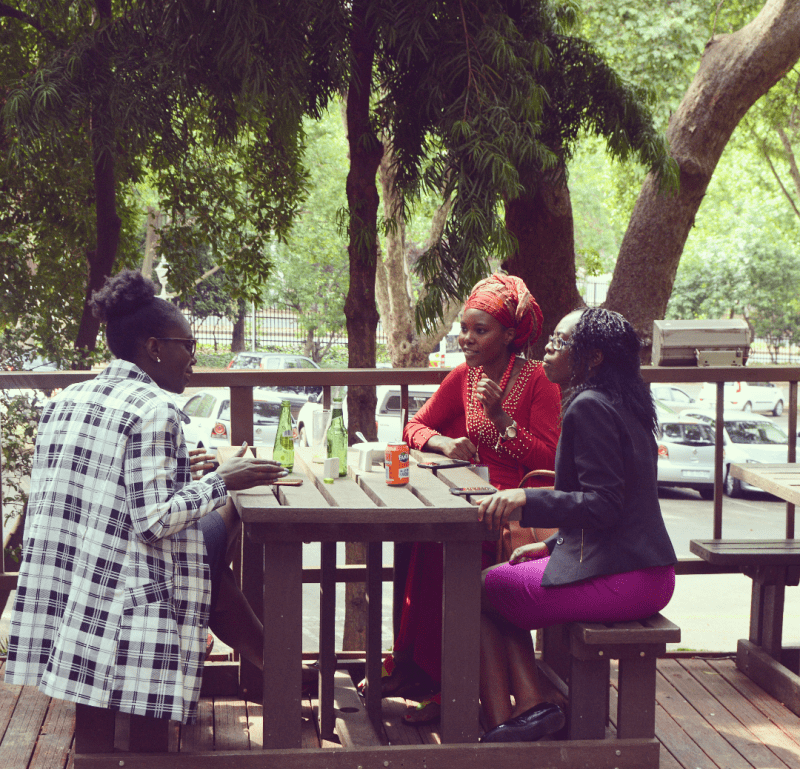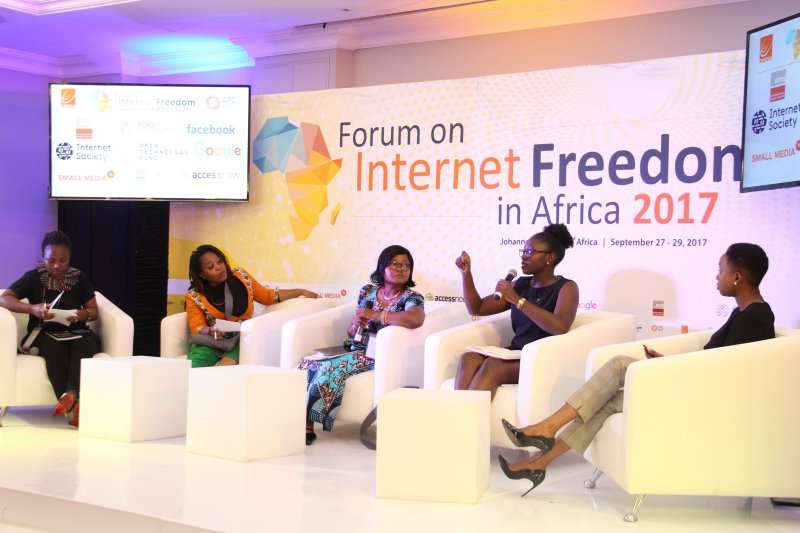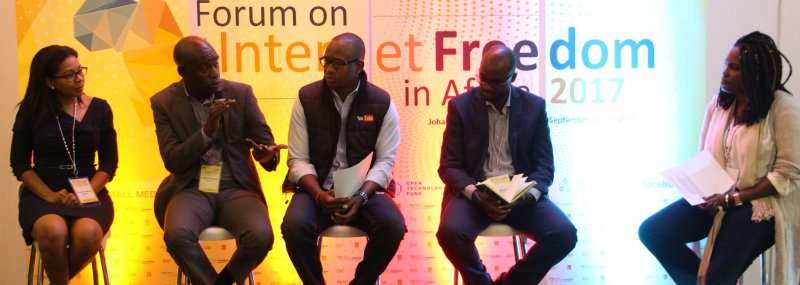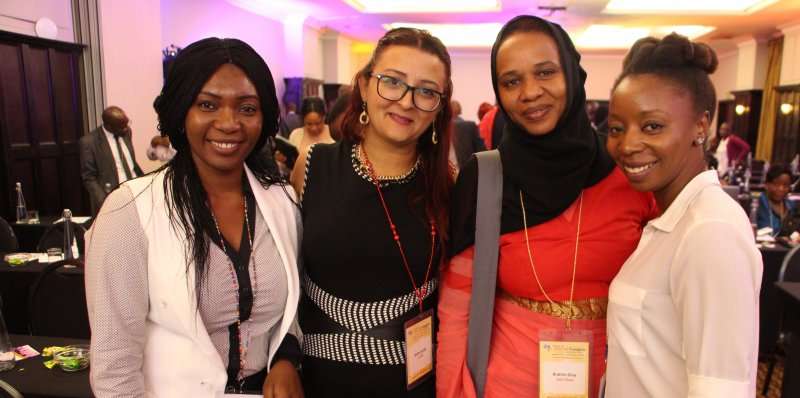Announcement |
The Collaboration for International ICT Policy in East and Southern Africa (CIPESA) is pleased to announce the fifth edition of the Forum on Internet Freedom in Africa (FIFAfrica). This year, the Forum will be hosted in partnership with the Media Foundation West Africa (MFWA) and will take place on September 26–28, 2018 in Accra, Ghana.
The Forum is a landmark event that convenes various stakeholders from the internet governance and online rights arenas in Africa and beyond to deliberate on gaps, concerns and opportunities for advancing privacy, access to information, free expression, non-discrimination and the free flow of information online on the continent.
Since inception, FIFAfrica has also served as a platform to mark the International Day for Universal Access to Information (IDUAI). Engagements at the Forum aim to reflect current trends and concerns in access and usage of the internet and related technologies on the continent. As such, each year has seen us launch themed research on the State of Internet Freedom in Africa. Last year, we also launched a key report on Calculating the Economic Cost of Internet Disruptions in Sub-Saharan Africa.
While the 2014, 2015 and 2016 editions of FIFAfrica were hosted in Uganda, in 2017, the Forum was hosted in Johannesburg, South Africa in partnership with the Association for Progressive Communications (APC), an international network and non-profit organisation that works towards a free and open internet.
Indeed, spreading the physical footprint of FIFAfrica across different regions of the continent ensures that the Forum lives up to its goal of unpacking internet freedom challenges and opportunities in sub-regions of Africa and developing responses that are collaborative, and informed by insights from the experience of other sub-regions of the continent. Hosting the Forum in in west Africa for the first time will not only open up the space to more west African civil society, private sector and public sector actors to contribute their experiences to the regional discussion, but will also give life to the Forum’s commitment of ensuring broader regional representation and deepening conversations across the continent.
At a practical level, skills development among participants is prioritized. Previous Forums have seen our partners AccessNow and DefendDefenders host digital security clinics. In 2017, The Localisation Lab hosted a localization sprint aimed at advancing the adoption of internet freedom tools in East and Southern Africa through translation of technologies and creation of key resources to support the education, training, and adaptation of digital security and circumvention tools in the region. This included the translation of tools into languages like Shona, Luganda, and Ndebele.
Other skills development events at the Forum have in the past included a workshop on Strategic Digital Rights Litigation hosted in partnership with the Berkman Klein Center for Internet & Society at Harvard University, and the Media Legal Defence Initiative (MLDI) and a workshop on human rights review mechanisms, which took participants through African and United Nations (UN) Universal Periodic Reviews processes which was hosted by APC, CIPESA and Small Media.
With strategic linkages to other internet freedom forums and support for the development of substantive inputs to inform the conversations on human rights online happening at national level, at the African Union and the African Commission on Human and People’s Rights (ACHPR), the African Internet Governance Forum (IGF), subregional IGFs, the global IGF, Stockholm Internet Forum (SIF), the Internet Freedom Festival (IFF), the Internet Freedom Forum (Nigeria) and RightsCon, among others, FIFAfrica provides a pan-African space where discussion from these other events can be consolidated at continent-wide level, drawing a large multi-stakeholder audience of actors.
See the evolution of the Forum on Internet Freedom in Africa (FIFAfrica)
 Share your thoughts on your vision for Internet Freedom in Africa using #InternetFreedomAfrica This year, the event hashtag is #FIFAfrica18
Share your thoughts on your vision for Internet Freedom in Africa using #InternetFreedomAfrica This year, the event hashtag is #FIFAfrica18
Propose A Session For #FIFAfrica18
Do you have suggestions of session topics, panels, skills clinics, presentations or any additional activities that you’d like to see happen prior or alongside the Forum. Use this form to submit your ideas.
Be A Part of #FIFAfrica18
Do you want to exhibit your work at #FIFAfrica18? Would you like to support #FIFAfrica18? Please send us an email: [email protected]



 Another key take away from these two sessions was the need to empower women and girls with information about their rights through access to the internet so they can recognise when those rights are being threatened or violated by another person. Often, women and girls are socialised and conditioned to think that they cannot make decisions without the approval of their male relations because from time in memorial, the power lies with men and women are constantly subjected to finding ways of not upsetting this hold on power and in effect remaining silent in the face of violence.
Another key take away from these two sessions was the need to empower women and girls with information about their rights through access to the internet so they can recognise when those rights are being threatened or violated by another person. Often, women and girls are socialised and conditioned to think that they cannot make decisions without the approval of their male relations because from time in memorial, the power lies with men and women are constantly subjected to finding ways of not upsetting this hold on power and in effect remaining silent in the face of violence.

 In a panel on privacy and freedom of expression, a representative from Zimbabwe’s Ministry of ICT, Postal and Courier Services asserted that the country will not shutdown the internet. Neither will they disrupt social media. The official stated that the negative effects of shutdowns initiated in other countries were clear and limiting access to the internet stifles expression, causes more harm than good. For an otherwise autocratic regime, this is telling of its appreciation of the impact technology has on the lives of citizens; social-economic and political.
In a panel on privacy and freedom of expression, a representative from Zimbabwe’s Ministry of ICT, Postal and Courier Services asserted that the country will not shutdown the internet. Neither will they disrupt social media. The official stated that the negative effects of shutdowns initiated in other countries were clear and limiting access to the internet stifles expression, causes more harm than good. For an otherwise autocratic regime, this is telling of its appreciation of the impact technology has on the lives of citizens; social-economic and political.

 L’Association pour le Progrès des Communications (APC) et la Collaboration on International ICT Policy for East and Southern Africa (CIPESA) a co-organisé FIFAfrica17 du 26 au 30 Septembre à Johannesburg en Afrique du Sud, #ISOCChad à été honnoré par madame Zina Brahim Mahamat, Coordonnatrice chargé de la formation au sein de l’internet Society of Chad, qui a été sélectionné parmi les boursiers pour y assister.
L’Association pour le Progrès des Communications (APC) et la Collaboration on International ICT Policy for East and Southern Africa (CIPESA) a co-organisé FIFAfrica17 du 26 au 30 Septembre à Johannesburg en Afrique du Sud, #ISOCChad à été honnoré par madame Zina Brahim Mahamat, Coordonnatrice chargé de la formation au sein de l’internet Society of Chad, qui a été sélectionné parmi les boursiers pour y assister.